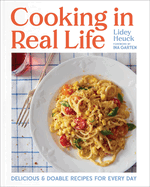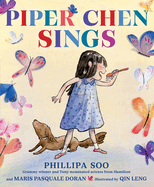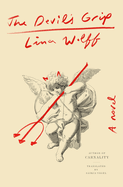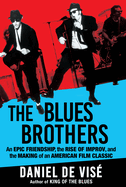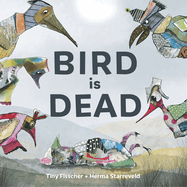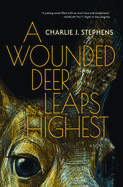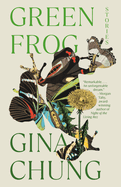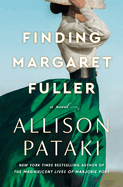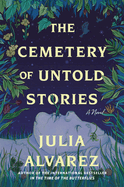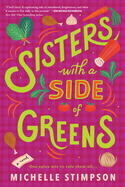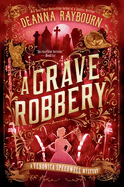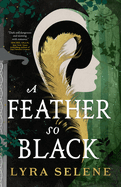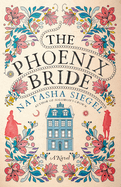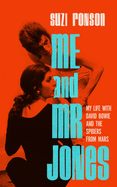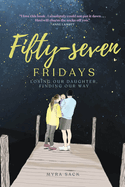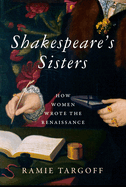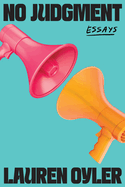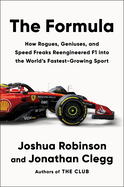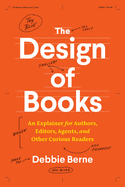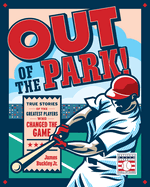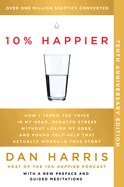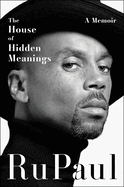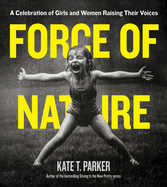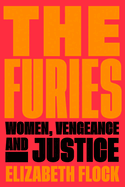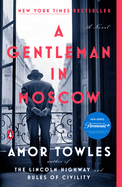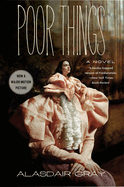Friday, April 5, 2024
In this week's newsletter, we review Nigerian author Damilare Kuku's debut, Nearly All the Men in Lagos Are Mad, a story collection featuring a dozen "rollicking, riotous stories" of "mad men and women getting out--and even," as well as Swedish novelist Lina Wolff's "magnetic fever dream" The Devil's Grip, a fast-paced story about "a woman pushed to the edge of sanity." Plus, we look at the "empowering picture book" Piper Chen Sings by Phillipa Soo, the award-winning performer who originated the role of Eliza in the musical Hamilton, inspired by "her own journey dealing with stage fright as a young child."
In The Writer's Life, poet and techno-thriller author Izzy Wasserstein discusses the authors who influenced her understanding of worldbuilding, power differentials, and how to put petty complaints to good use.
Nearly All the Men in Lagos Are Mad
by Damilare Kuku
A dozen rollicking, riotous stories comprise Damilare Kuku's debut, Nearly All the Men in Lagos Are Mad, already a bestseller in her native Nigeria. Indeed, most of these men are angry or insane (or both), but women figure out how to get even. Kuku writes with a casual intimacy as if sharing secrets and (by)passing gossip. Women skillfully reclaim control from undeserving partners. In "Cuck-Up," a man's lazy greed gets unmasked to his entire judgmental family. A woman refuses to settle for possessive men--of any color--in "International Relations." In "Ọ̀dẹ̀-Pus Complex," a weak man and his controlling mother get dumped. Liars and cheaters inevitably become losers: a woman deftly, finally discards her lothario husband in "First Times"; the wives of gay men hatch their own plans in "Beard Gang"; and a childless wife ditches her deceptive spouse in "A Lover's Vendetta." Stories narrated by male protagonists turn confessional: "The Gigolo from Isale Eko" reveals the worst--and hints at the best--of men; "I Knew You" presents a self-induced miserably lonely man.
Convoluted relationships here are many, as are plenty of steamy conjugal encounters. Kuku favors second-person narration, underscoring a sense of complicity between writer and readers--sometimes in warning ("you will calmly put a knife to your husband's penis and promise to cut it off") and other times in triumph ("You walked out"). First-person seems reserved mostly for men, as if acknowledging their agency in creating their own disappointments and destruction. Kuku's unflinching insight and irresistible charm promises profundity--and (mad) laughter. --Terry Hong
Discover: Nigerian author Damilare Kuku's debut story collection is an enthralling revelation about mad men and women getting out--and even.
A Wounded Deer Leaps Highest
by Charlie J. Stephens
A Wounded Deer Leaps Highest is a heart-wrenching first novel by Charlie J. Stephens that incorporates moments of beauty in a traumatizing coming-of-age tale. In the 1980s, eight-year-old Smokey Washington lives with their mother in Moss River, Ore., a small town beset by poverty, violence, and a shortage of options for improving one's lot, but surrounded by vibrant natural life. As Smokey's situation worsens, they turn increasingly toward that outside world, seeking solace in dirt, deer, and trees. The tragedies that befall Smokey and their family and neighbors will disturb even jaded and strong-stomached readers, but notes of stark truth and tenderness filter through. A will to live pervades these pages from beginning to end.
Smokey is a child who engages with animals and the outdoors more than with people, and who doesn't fall into a gender binary. Stephens gives the child narrator a wise, inquisitive voice. Their descriptions and perspective are insightful, often surprising, and lovely. Mom drinks steaming coffee and smokes Lucky Strikes; Smokey wonders if "evaporating the things she loves is her most practiced spell." Smokey sees her as a crow in her black jacket; for themself, they hope to grow up and become a deer. "I want to spend more time low to the ground.... I want my animal body. I want to get it back."
A Wounded Deer Leaps Highest offers a harrowing and wholly realistic story of suffering, but also a message about resiliency, the healing power of nature, and simple survival. Stephens's debut will shock its readers with love, pain, and fresh perspective. --Julia Kastner, librarian and blogger at pagesofjulia
Discover: In a town beset by poverty and violence, an unusual child turns to the natural world for comfort in this novel of suffering and tenderness.
Green Frog
by Gina Chung
Although Gina Chung's Green Frog nimbly encompasses multiple genres, fraught parental relationships unite many of the impressive collection's 15 stories. Charged sibling comparisons are often at play, too. In both "The Sound of Water" and the titular story, one sibling is favored over another, wreaking havoc on the latter's self-esteem. The less-favored child abandons their future plans--in both stories, dropping out of college--to return home for a dying or aging parent and help with the family business.
"Human Hearts" centers on a young kumiho--a nine-tailed fox from Korean folklore--and also encompasses these themes. To appease her demanding mother, plain Okja must avenge her better-loved, beautiful twin sister's death from a poisoned snare set by the shaman's son. Chung (Sea Change) masterfully balances sentiment and compassion, careful never to tip into a maudlin tone.
In the eerily speculative "Attachment Processes," one of the most moving stories of the collection, a mother has a second chance at raising her daughter. Chung writes: "And what is a family but a group of people who agree to believe in these revisions together, to pretend that they do not see the small cracks and fissures where the stories do not quite align?" The stilted, synthetic result of the do-over motherhood is forlorn and haunting.
Transformation suffuses this collection. Sometimes it's overt and physical, as in "Human Hearts" and in "Honey and Sun." At other times it's more subtle and internal, such as in "Presence" and "The Arrow." Chung's ability to capture these moments allows light into heavy stories--and maybe even glimpses of hope. --Nina Semczuk, writer, editor, and illustrator
Discover: A wild and wonderful smorgasbord of short stories that range from reality to reimagined folklore to speculative tech, each with an aching, tender core.
Finding Margaret Fuller
by Allison Pataki
Allison Pataki (Beauty in the Broken Places) imagines the brilliant, bittersweet, and mostly forgotten life at the center of the American Transcendentalist movement in Finding Margaret Fuller. Fuller was, as Ralph Waldo Emerson put it, the "radiant genius and fiery heart" of an eclectic circle of mid-19th-century American thinkers that included Henry David Thoreau, Nathaniel Hawthorne, and Emerson himself. Pataki blows the dust from Fuller's legacy as she inhabits her protagonist's persona, beginning with her first life-changing meeting with Emerson in Concord, Mass., in 1836. Fuller recognizes in the eminent man an intellectual soulmate--"ours is a kinship of the mind"--and the friendship guides her as she continues her quest for self-realization that leads to increasing renown in America and Europe.
Fuller, described by her father as "the Much that always wants More," possesses an insatiable desire for life and meaning, which Pataki captures with exuberant prose. Fuller publishes bestselling book after book and makes history by becoming the first female editor of a major journal, the Dial, and, later, the first American female foreign news correspondent for Horace Greeley's New-York Tribune. But there is pathos aplenty for "this butterfly who never had a place to land," and Pataki's indelible exploration of Fuller's vibrant interiority as both a writer and a woman simply mesmerizes. Chronicling an epochal time of progressive thought, Finding Margaret Fuller reintroduces to a new generation a courageous woman and peerless thinker, "whose words will never die." --Peggy Kurkowski, book reviewer and copywriter in Denver
Discover: Margaret Fuller, the woman at the heart of the American Transcendentalist movement in the 19th century, returns to inspire a new generation in this admiring and expansive retelling of her life.
The Cemetery of Untold Stories
by Julia Alvarez
In her thought-provoking seventh novel for adults, The Cemetery of Untold Stories, Julia Alvarez (Afterlife) weaves a complex narrative that is primarily about stories. Through a literal graveyard for abandoned stories in the Dominican Republic, Alvarez's protagonist, Alma Cruz, and the cemetery's caretaker, Filomena, reckon with the layers (both beautiful and heartbreaking) of stories that belong to them and to others.
Alma decides to stop writing, releasing the whispering guilt of her unfinished stories. When her cemetery is finally constructed, she hires a local woman, Filomena, to watch over the space. Filomena begins listening to the sculptures and stories in the odd cemetery (per Alma's instructions) and finds that some stories (and characters) don't want to stay silent. As Alma and her three sisters dig into their recently deceased father's life, trying to unearth his secrets, Filomena listens to Manuel Cruz tell his own story--the parts both known and unknown to his daughters.
Speaking in her characters' multiple voices, Alvarez shares the details of their lives: family dynamics, hard work, immigration, love, rejection, grief, surprises. The larger narrative, like the cemetery itself, ponders the question of whose stories receive priority: Is it the privileged? The powerful? The beautiful? Or simply those who find a listening ear? Alvarez also wonders about the layers of stories hidden from one's own family members, the ways a story can change and revise itself over time, and who gets the final say. Mystifying, compelling, and often wryly funny, The Cemetery of Untold Stories is a lyrical meditation on storytelling, truth, family, and the quicksilver nature of narrative itself. --Katie Noah Gibson, blogger at Cakes, Tea and Dreams
Discover: Julia Alvarez delivers a lyrical, thought-provoking meditation on truth, complicated family narratives, and the question of whose stories get told.
Sisters with a Side of Greens
by Michelle Stimpson
In Sisters with a Side of Greens, Michelle Stimpson (Falling into Grace) presents a heartwarming tale of second chances as two sisters reunite after decades of bitterness. Stubborn, sharp-tongued Rose sent her sister, Marvina, $40 to register a restaurant for them in Fork City, their small Texas hometown, but Marvina used the money to bail her boyfriend out of jail. Rose never forgave her and spent 40 years in Dallas, working a boring job. Conservative, equally hardheaded Marvina still lives in Fork City, often frying chicken in the kitchen of her beloved church and missing her late husband.
On Rose's last day at the post office, she passes out at her retirement party. David, her ex-husband and her emergency contact, cares for her for several days, noting that her cooking isn't as good as it used to be. Appalled and realizing that she's forgotten Momma's exact seasoning recipe, Rose heads back to Fork City to try to get the recipe out of Marvina. But after 40 years of grudge-holding, can they ever let go of the hurt between them?
Sisters with a Side of Greens, tender and amusing, is perfect for fans of Terry McMillan. Full of Southern charm, the novel considers the feisty opinions of two strong Black women who are each sure that her sister is in the wrong. Slowly, as the sisters spend time together and an unexpected event draws them even closer, they realize that their sisterly bond might be stronger than all the petty things that have come between them. --Jessica Howard, freelance book reviewer
Discover: This heartwarming tale of two sisters reuniting after 40 years of estrangement is perfect for fans of Terry McMillan.
Mystery & Thriller
The Devil's Grip
by Lina Wolff, transl. by Saskia Vogel
Swedish writer and translator Lina Wolff (Carnality) crafts a magnetic fever dream in The Devil's Grip, a fast-paced novel, hypnotically translated by Saskia Vogel, about a woman pushed to the edge of sanity by an abusive relationship.
A woman moves to Florence, Italy, from her home country and is overwhelmed by its romance and her own loneliness. But its dark corners begin to look more appealing after she pairs up with an unremarkable-looking man who goes by Mickey to her Minnie. Minnie is drawn to Mickey by his intensity, his control, and the way he makes her aware of her own body. Mickey, however, grows increasingly violent and disloyal in his sexual acts, and Minnie becomes convinced that their bodies are only vessels for the demons inside them both. Despite the novel's progressively surrealist nature, Wolff's masterful prose keeps the story grounded in the precision and simplicity of language, the immediacy of bodily sensation, and the necessity of desire.
Though Wolff rarely engages in the spectacle of showing physical abuse on the page, the novel's narrator often makes readers stare, mesmerized, at the material remnants of that violence. The emotional abuse Minnie suffers from Mickey is extreme; so, too, is the mental and emotional abuse she suffers at the hands of the larger world, which contributes to her destruction even as it attempts to help her. Minnie's seeming downward spiral notwithstanding, Wolff's novel avoids thinking of Minnie's arc as solely a destruction; instead, her arc is a struggle, not just against the man she thinks she loves, but against forces much greater than he could ever be. --Alice Martin, freelance writer and editor
Discover: A Lynchian drama about gendered, relational violence, Lina Wolff's The Devil's Grip is sure to mesmerize and terrify readers in equal measure.
A Grave Robbery
by Deanna Raybourn
A Grave Robbery, the ninth Veronica Speedwell mystery from Deanna Raybourn (Killers of a Certain Age), is an effervescent delight. This twisty investigation--with laugh-out-loud funny repartee between the indomitable Veronica, a talented lepidopterist, and her handsome partner, Stoker--is historical mystery at its finest.
The case begins when Lord Rosemorran, the eccentric earl who sponsors Stoker and Veronica's research, brings them a wax figure of a beautiful woman. She appears to be an "Anatomical Venus," popular among Victorian anatomists for studying the human body. Lord Rosemorran wants Stoker, a gifted taxidermist, to try to make the Sleeping Beauty "breathe" like the one in Madame Tussaud's waxworks. But when Stoker cuts into the wax figure in order to install a breathing apparatus, he is appalled to discover internal organs. What they thought was a wax figure is a dead woman, cleverly embalmed.
Veronica and Stoker, determined to find out who the dead woman was and bring whoever desecrated her body to justice, set off on madcap adventures that take them from a shoddy circus to the elite of London society. With the eager help of reporter J.J. Butterworth and the reluctant assistance of Inspector Mornaday, the intrepid duo leaves no stone unturned in their search for the truth. As Stoker says, "Who but us would undertake such activities? Do you really imagine London is full of natural scientists repeatedly and relentlessly distracted from their work by felonies and mayhem?" Engaging from beginning to end, A Grave Robbery can be read alone but will send readers scrambling to read the rest of the entries in this charming series. --Jessica Howard, freelance book reviewer
Discover: This hilariously clever Victorian mystery series sends two naturalists on a quest to uncover the person who disguised a body as an artistic waxwork.
Science Fiction & Fantasy
A Feather So Black
by Lyra Selene
A fae changeling is torn between two worlds and two suitors in the luxuriantly poetic, extravagantly sexy romantic fantasy novel A Feather So Black by Lyra Selene (Amber & Dusk).
Years ago, the evil Fair Folk stole the human High Queen's daughter Eala away to Tír na nÓg, "a place beyond mortal knowing," and left changeling Fia in her place. Fia has trained since childhood to be a spy and weapon, fiercely loyal to the Queen who calls her "daughter" amid a court that fears her magic. Then a gateway to Tír na nÓg is discovered; Eala is on the other side--alive but cursed. The queen sends Fia and Rogan, Fia's star-crossed love interest and Eala's betrothed, to rescue Eala. Fia is also tasked to steal the immensely powerful Sky-Sword from the fae lord holding Eala captive. However, nothing in the land of the Folk is straightforward. Fia's chemistry with Rogan is undeniable but complicated by the sisterly connection she feels with Eala. The shadowy fae lord, Irian, is "beauty and bane... delight and dread." Fia, who has always hated her magic for its ability to kill, finds her heart divided not only between two men but also between the queen who raised her and the chance to embrace her true self.
Selene's decadent prose conjures an enchanting and perilous world inspired by Celtic folklore. Scrappy, vulnerable Fia is a joy to follow as she discovers her power and the love she deserves. A Feather So Black's high stakes and high emotion cast a swoon-worthy spell sure to enthrall readers. --Jaclyn Fulwood, blogger at Infinite Reads
Discover: This poetic, sexy fantasy follows a changeling spy torn between her human childhood sweetheart and a dangerous fae lord.
Romance
The Phoenix Bride
by Natasha Siegel
The Phoenix Bride by Natasha Siegel (Solomon's Crown) is an emotional tale of star-crossed lovers. Overcome with grief after her husband dies from the plague, Cecilia is hidden away in her sister Margaret's London townhouse. Staunchly Protestant Margaret, desperate to cure her sister, turns to a Jewish doctor as a last resort. David Mendes emigrated to London when the ban on Jews was lifted, abandoning his life as a crypto-Jew in Portugal. He still faces antisemitism, and he isn't even sure how he feels about religion, especially as a bisexual man. David and Cecilia live in very different worlds, despite inhabiting the same city, but neither can deny the strong attraction growing between them. Ironically--and tragically--Cecilia's desire to try to live happily again is inspired by someone she can never legitimately be with, and David's heart thaws for someone whose powerful family could destroy him.
Siegel vibrantly portrays the protagonists' intimate lives against the backdrop of a gorgeously textured early modern London. Details include the return of the monarchy, the novelty of coffeehouses, molly houses where gay men could meet, and the shoulder-rubbing of gentility and common folk in the newly renovated St. James's Park. Siegel deftly balances the bleak reality of antisemitism and genteel women's restrictions with the romantic prospect of a happily-ever-after, leaving readers hoping against hope that Cecilia and David can defy society's prejudices. Without resorting to anachronism, Siegel also depicts mental illness with sensitivity through David's innovative methods of treating mind and body together. Strong characters and powerful emotions will keep readers breathless until the last satisfying pages. --Dainy Bernstein, postdoc in children's literature, University of Illinois Urbana-Champaign
Discover: A grief-stricken widow and a Jewish doctor who fall in love battle the prejudices of early modern London in this intimate and emotional historical romance.
Food & Wine
Cooking in Real Life: Delicious & Doable Recipes for Every Day
by Lidey Heuck
Cooking in Real Life: Delicious & Doable Recipes for Every Day may be Lidey Heuck's first cookbook, but she's no stranger to the home-cooking scene. As Ina Garten's assistant, Heuck developed and honed not only her cooking skills but also the art of recipe creation. Combining her work since then (contributing recipes to the New York Times, working as a prep cook at a Maine restaurant, and teaching cooking classes) with her experience as a busy wife and mother, Heuck offers other home cooks a collection of recipes that are "inventive but not overly complicated" and "use familiar ingredients but encourage us to do things a little bit differently."
For many recipes, Heuck recommends easy substitutions based on dietary restrictions or what's available (or missing) at readers' local grocery stores. It's a great tactic to set home cooks at ease; if Golden Beet Dip with Yogurt & Tahini sounds intimidating, her "simple swap" is using standard red beets, which Heuck notes will have a stronger flavor. She also flags recipes that are well-suited to advanced prep: readers can "get ahead" on the Marinated Fennel & Green Bean Salad by assembling the entire dish and letting it marinate at room temperature until ready to serve. Updated classics include a Celery Waldorf with Pickled Golden Raisins. And in recipes such as the Shortcut Chicken Schnitzel, Heuck offers tips on using fewer dishes while cooking. Her straightforward instructions, suggested menus, and easy add-ons make elevating a weeknight meal seem not only doable but also appealing. --Kristen Coates, editor and freelance reviewer
Discover: This collection of achievable yet elevated recipes from a New York Times recipe contributor and Ina Garten's former assistant makes weeknight cooking not only doable but also appealing.
Sesame, Soy, Spice: 90 Asian-ish Vegan and Gluten-Free Recipes to Reconnect, Root, and Restore
by Remy Morimoto Park
In Sesame, Soy, Spice, Remy Morimoto Park, social media influencer and creator of the popular Veggiekins blog, shares many recipes inspired by her background: Korean on her father's side and Japanese and Taiwanese on her mother's. After spending a decade struggling with anorexia nervosa, Park found healing in vegan eating. She now uses her cooking to connect her plant-based lifestyle with her Asian roots.
Growing up in New Jersey, Taiwan, and Shanghai--before returning to New York for college--Park was exposed to many different cultures and cuisines. Her cookbook reflects this variety with an array of delectable meals, snacks, and sweets. Recipes include Shredded Korean BBQ Bulgogi Tofu, Garlic Smashed Potatoes with Shishito Peppers, Crispy Rice Salad, Popcorn Tofu, and Matcha Madeleines.
Sesame, Soy, Spice--with luscious pictures and fascinating anecdotes about cooking and eating with her family members and friends all across the world--is an homage to Park's heritage. She also candidly shares stories of her years of counting calories and avoiding food, making this a hopeful glimpse into the rekindling of a love of food after an eating disorder. With easy-to-follow recipes, explanations on where best to source specialty Asian ingredients, and inviting stories to explain how Park came to create each recipe, Sesame, Soy, Spice is a truly lovely cookbook. It's irresistible and perfect for vegan and gluten-free eaters, but it's sure to have a broader appeal for foodies and home cooks as well. --Jessica Howard, freelance book reviewer
Discover: This beautiful cookbook features "Asian-ish" vegan recipes sure to appeal to foodies and home cooks alike.
Biography & Memoir
The Blues Brothers: An Epic Friendship, the Rise of Improv, and the Making of an American Film Classic
by Daniel de Visé
The birth story of a surprisingly enduring musical action comedy provides the framework for a detailed and insightful examination of John Belushi and Dan Aykroyd's partnership in The Blues Brothers by Daniel de Visé (King of the Blues; I Forgot to Remember, with Su Meck).
Aykroyd's and Belushi's Blues Brothers personas could be the basis for several books. Born out of Aykroyd's love for classic blues music and his desire to share it with Belushi and the world, the act appropriated the work of Black musicians yet, at the same time, artists such as James Brown credited it as helping to revive their careers. De Visé examines the phenomenon both critically and lovingly. Though hindsight tells us the film became a classic despite its initial poor reception, the detail with which de Visé conveys budget issues and difficulties caused by Belushi's substance abuse creates real suspense.
The heart of the story is the friendship between the two stars. It's clear that de Visé finds Belushi the more interesting subject and seems more inclined to think of Aykroyd as his friend and caretaker. In a book that often references Aykroyd's depth of knowledge about obscure subjects such as military hardware, and how the iconic Blues Brothers sunglasses "freed Dan from the awkward business of eye contact," it seems odd to mention only his childhood diagnosis of Tourette's and not his public acknowledgment of other neurodivergent traits. Still, fans who admire one or both of these comedians will find plenty of fascinating material in this fresh examination of success and tragedy. --Kristen Allen-Vogel, information services librarian at Dayton Metro Library
Discover: This heartfelt story examines the friendship that created a beloved and controversial musical action comedy.
Me and Mr. Jones: My Life with David Bowie and the Spiders from Mars
by Suzi Ronson
Suzi Ronson (née Fussey) was no rock wife. True, she married a famous guitarist, but she didn't want to be defined by her man. "I see the life of a musician's girlfriend or wife laid out in front of me, and I know that's not where I want to be," she writes in the clear-sighted and demystifying Me and Mr. Jones: My Life with David Bowie and the Spiders from Mars.
Ronson was working at a London-area hair salon when a client started bragging about her son, who turned out to be David Bowie. Next thing Ronson knew, she was giving Bowie the spiky red mullet that helped define his Ziggy Stardust persona. In 1972, Ronson was hired to take charge of the band's hair, makeup, and costumes; she also joined the lads on tour ("My haircut is everywhere!"). After Bowie dissolved the band, she paired off with his now-a-free-agent guitarist, Mick Ronson, but without work, she felt like "the pathetic girlfriend, clinging on to my man, a position I never thought I'd find myself in."
Me and Mr. Jones is written in a present tense that often breathlessly recaptures the young Ronson's naïveté ("What will I say if David talks about Rimbaud, or Nietzsche?"). Although Ronson doesn't mention the day's feminist movement, the book's through line is her awareness of how the rock scene regarded women. Me and Mr. Jones is for Bowie aficionados but also for anyone interested in the unsung women who made classic-rock stars shine brighter. --Nell Beram, author and freelance writer
Discover: This memoir by the woman partly responsible for David Bowie's iconic Ziggy Stardust look is for anyone interested in the unsung women who made classic-rock stars shine brighter.
Fifty-Seven Fridays: Losing Our Daughter, Finding Our Way
by Myra L. Sack
Fifty-Seven Fridays is a candid, intimately courageous memoir that details how the terminally ill baby daughter of first-time author Myra Sack and her husband, Matt, left an indelible mark in the world--defining the fragility of life and the sacred nature of love.
In 2011, Myra, a "Philly girl," met Matt, a "Cali boy," in San Francisco. The years of their romance--falling in love, moving to Boston, and marrying in 2016--culminated when, on September 4, 2018, they welcomed their first child, a "beautiful. Perfect, actually," baby daughter, Havi, into the world. Amid the joy and adulation of the birth, no one could foresee how, a year later, Havi's health would drastically change the focus and meaning of the family's existence.
Havi was ultimately diagnosed with Tay-Sachs, a progressively debilitating, terminal neurological disease in children that destroys nerve cells in the brain and spinal cord. Knowing Havi's time on earth was limited--children with Tay-Sachs live only two to four years--heartbroken Myra and Matt vowed to squeeze every "ounce of beauty and love" into Havi's short life. Relying on Jewish tradition, Myra and Matt also decided to celebrate every Friday night sabbath, also known as Shabbat, as a joyful birthday party or "Shabbirthday" for Havi, family, and friends.
These weekly gatherings proved life-affirming and gratitude-producing. Slice-of-life episodes and meditative journal entries oozing with raw emotion detail myriad aspects of the family's profound, grace-filled journey through grief, sadness, and loss. Sack's inspirational narrative beautifully preserves and pays tribute to Havi's short life and the love that continues to endure--and ripple out to others--in her wake. --Kathleen Gerard, blogger at Reading Between the Lines
Discover: This profound, inspirational memoir by the mother of a baby who suffered from Tay-Sachs disease, chronicles the way her child's brief life defined the sacred nature of life and love.
History
Shakespeare's Sisters: How Women Wrote the Renaissance
by Ramie Targoff
"What did it take for a woman in Renaissance England to enter the overwhelmingly male world of literature?" This is the central question decisively answered in Shakespeare's Sisters: How Women Wrote the Renaissance by Ramie Targoff, the Jehuda Reinharz Professor of the Humanities and co-chair of Italian Studies at Brandeis University.
The study is a captivating and revelatory look at the long-neglected literary output of English women writers of the Renaissance, writers often thought not to have existed at all. But here are four in exquisite detail: Mary Sidney, Aemilia Lanyer, Elizabeth Cary, and Anne Clifford, all demonstrably writing in Elizabethan and Jacobean England.
The women shared several qualities that afforded them this role: not only literacy, of course, which was a feature of relative affluency (or adjacency to it), but also access through a male figure close to them. For example, Sidney's literary career began with the death of her accomplished brother, whose work she finished before moving on to translation and poetry. Cary, too, began her literary production as a translator of work written by men. Lanyer, Clifford's one-time tutor, wrote the first "country house" poem, while Clifford became "the most important female diarist of the era."
Targoff (Renaissance Woman: The Life of Vittoria Colonna) treats readers to the vibrant complexity of the time with all its intrigue, perilousness of social jockeying, and the issues women took up while writing. It's a singularly entertaining and insightful work of literary history as well as an illustration of how such history is richer and more interesting when everyone who has contributed is recognized. --Elizabeth DeNoma, executive editor, DeNoma Literary Services, Seattle, Wash.
Discover: Shakespeare's Sisters is an extraordinary accomplishment, essential for literary historians as well as general readers.
Social Science
Exurbia Now: The Battleground of American Democracy
by David Masciotra
There are probably more suitable books to give one's Trump-loving uncle than David Masciotra's Exurbia Now: The Battleground of American Democracy. But nonpartisan and even semi-partisan readers should find their minds opened by journalist Masciotra's incisive, worry-making, and deeply humane book, which sits somewhere between an exposé and a long-form think piece.
Since the tumultuous year 2020, Masciotra reports, residency in exurbia has been on the upswing: "Once the land of trailer parks, it is now full of planned communities--new single-family homes in close proximity to wide roads, big box retailers, chain restaurants, and megachurches." What's behind this white flight, explains Masciotra, is increasing discomfort with suburbia's trend toward liberalism and racial and ethnic diversity. For Masciotra, it's concerning when large numbers of people leave cities and suburbs for the relative isolation of the exurbs, whose lack of sidewalks discourages strangers but also neighborliness. Perhaps not incidentally, "the rank and file in the January 6 insurrectionist mob was populated heavily with residents of exurban towns."
Exurbia Now is rich with the author's personal stories. Masciotra (I Am Somebody: Why Jesse Jackson Matters) is no coastal elite: he hails from a blue-collar family and was raised, and resides, in the suburban Midwest. Whether he's discussing the significance of pickup-truck ownership or the dangers of feverish nostalgia, Masciotra reinforces his cautionary points with pop culture references and song lyrics. In fact, his readers may feel that the names Springsteen and Mellencamp get nearly as much ink as the name Trump. --Nell Beram, author and freelance writer
Discover: Masciotra's incisive, worry-making, and deeply humane look at the upswing in exurban living since 2020 sits somewhere between an exposé and a long-form think piece.
Essays & Criticism
No Judgment: Essays
by Lauren Oyler
Lauren Oyler (Fake Accounts), known for her bold literary and cultural criticism found in outlets such as Harper's and the New Yorker, does not disappoint with No Judgment, her perspicacious debut essay collection. Oyler, who has also written fiction, offers eight pieces, marked by her characteristic verve and meticulousness, that address matters such as gossip, autofiction, expatriation, and criticism. Not one to avoid a challenge, she aims her keen mind at tricky subjects, such as the ubiquity of therapy and medication, Brené Brown's popularization of vulnerability, and spoilers.
A number of her remarkable essays far surpass the initial premise and promise of the opening paragraphs. For instance, "My Perfect Opinions" starts with a story about a writer gaming the Goodreads review system and ends with a sharp take on the insidious and destructive power of pop culture, with stops along the way addressing the fascinating history of star ratings, celebrity thin skin, the role of the critic in society, elitism, Marvel movies, and more. Other essays, such as "Embarrassment, Panic, Opprobrium, Job Loss, Etc," circle back on themselves in ways that cleverly reflect the interrogated topics.
Rather than the far-ranging essays of, say, Rebecca Solnit, who often assembles disparate elements within a single piece, Oyler adeptly employs her research and logic to stay tight to a theme. Most delightfully, her sardonic voice permeates the entire collection. She writes: "I despise a happy ending; a happy ending says, to me, absolutely nothing about life except that humans have a near-universal desire for a happy ending that is basically unfulfillable if you have any critical thinking skills at all." --Nina Semczuk, writer, editor, and illustrator
Discover: In No Judgment, a clever essay collection, a self-aware book and culture critic extricates fresh perspectives on cultural phenomena.
Sports
The Formula: How Rogues, Geniuses, and Speed Freaks Reengineered F1 into the World's Fastest-Growing Sport
by Joshua Robinson and Jonathan Clegg
This exhilarating, high-speed history of Formula 1 auto racing provides fans with insider access to the futuristic innovations, shrewd business strategies, and sensational scandals behind one of the world's most thrilling sports. The Formula: How Rogues, Geniuses, and Speed Freaks Reengineered F1 into the World's Fastest-Growing Sport is co-authored by European sports correspondent for the Wall Street Journal Joshua Robinson and Wall Street Journal sports editor Jonathan Clegg, who also collaborated on The Club.
The Formula tracks the franchise from when resourceful entrepreneur Bernie Ecclestone built the foundations of modern Formula 1 in the 1960s to the present-day experimental marketing strategies of Liberty Media that set the stage for the explosive refueling of a dormant American fanbase.
Robinson and Clegg declare that "F1 is as much a technology problem to be solved as it is a competition to be won," and they go on to showcase the many advancements dreamed up by each team's technological director, sometimes with a "level of computing power that would impress NASA."
Throughout the book, the authors share captivating anecdotes about a complicated and fascinating cast of characters. All the greats are here: legendary teams--Ferrari, Mercedes, and Red Bull Racing--and drivers "without normal human fear receptors," such as Enzo Ferrari, Niki Lauda, Ayrton Senna, Lewis Hamilton, and Max Verstappen.
Robinson and Clegg narrate this history with great insight, humor, and--like the team engineers--much attention to detail. Long-time fans of the sport will find a great deal here to fill in any gaps in their knowledge, and newer converts will be inspired to immediately look up the next season's racing schedule. --Grace Rajendran, freelance reviewer
Discover: The Formula is a perceptive, high-octane exploration of the history of Formula 1 auto racing.
Reference & Writing
The Design of Books: An Explainer for Authors, Editors, Agents, and Other Curious Readers
by Debbie Berne
Readers who prefer physical books as well as those who opt for e-readers might not notice the choices that go into creating and presenting books and how they impact interaction with the text. But the remarkable The Design of Books: An Explainer for Authors, Editors, Agents, and Other Curious Readers by Debbie Berne can fix that. Berne provides insights into all the components of different kinds of book design--from things that readers might have considered, such as the cover ("a book's visual identity"), to details they probably haven't, such as the difference between typeface and font.
Berne, a book designer with hundreds of books and their covers under her belt, is the best kind of writer-teacher, one who both knows and cares deeply about her subject and doesn't shy away from sharing her thoughts on all elements of book creation. She writes, for example: "Conflating underline, something you do to type, with bold and italic, which are kinds of type, is one of the most egregious typographic crimes committed by word processing software."
She explains what all books have in common, such as front matter and running heads, as well as characteristics that differentiate them. For instance, when creating an illustrated book (whether cookbooks or graphic novels), there's a vast array of considerations such as paper and trim size. Berne also covers the arcane and little-known histories of how various conventions evolved over time, and much more. It's riveting reading for anyone who loves the magic of a good book. --Elizabeth DeNoma, executive editor, DeNoma Literary Services, Seattle, Wash.
Discover: The Design of Books is a priceless resource for writers, lovers of books, lovers of design, and lovers of all things publishing.
Children's & Young Adult
Piper Chen Sings
by Phillipa Soo and Maris Pasquale Doran, illus. by Qin Leng
Debut authors Phillipa Soo and Maris Pasquale Doran create an empowering picture book in Piper Chen Sings, gloriously enhanced by the wondrous illustrations of Qin Leng (Over the Shop; The Better Tree Fort).
Young Piper is a musical force, "always singing out a tune." In her favorite class at school, Mr. Harris recognizes her talented enthusiasm and offers her a solo in the upcoming Spring Sing. Her initially excited "Yes!" doesn't last long, however, because suddenly, "she can only sing in a worried whisper."
By the time she returns home, Piper's twirling, bouncing, hopping melodies are gone. "I felt like butterflies were having a dance party in my belly," Piper explains to her grandmother. "Húdié," Năi Nai interprets, the Chinese word for butterfly. These butterflies, she gently offers, are actually encouraging visitors who announce "something exciting [is] ahead." On the night of the show, Piper channels Năi Nai's reassuring wisdom, welcomes the butterflies... and sings.
Soo, the award-winning performer who originated the role of Eliza in the musical Hamilton, reveals in her author's bio that this story is inspired by her own journey dealing with stage fright as a young child. The authors fill their pages with an infectious buoyancy that's reflected in a narrative peppered with dynamic descriptions. Artist Leng's whimsical ink, watercolor, and oil pastel drawings are rife with details and delights. Leng's settings are especially marvelous: her classroom is filled with diverse, eager students; backstage is cluttered with unused props and equipment behind the children getting ready to take the spotlight. Soo, Doran, and Leng ensure Piper soars. --Terry Hong
Discover: Debut authors Phillipa Soo and Maris Pasquale Doran, buoyed by Qin Leng's delightful illustrations, offer empowering, entertaining encouragement in Piper Chen Sings.
The Lightning Circle
by Vikki VanSickle, illus. by Laura K. Watson
The Lightning Circle by Vikki VanSickle (If I Had a Gryphon) is a sweet, nostalgic, and evocative recollection of a heartbroken camp counselor's experience at an all-girls summer camp.
It's the summer of 2006 and 17-year-old Canadian Nora is crushed. She's "suffocating at home/ .../ where his name/ hangs heavy in the air,/ like smog," so she decides to be a counselor at an all-girls camp in West Virginia. During the day, she bonds with her new camp family but at night she still suffers from a "stupid, swollen heart." Just when Nora feels like she's found her footing at camp, a letter bearing unwanted news from the boy she's trying to forget arrives and suddenly her "throat/ eyes/ heart/ all raw." Nora turns inward, but the connections she's formed with her "summer sisters" will help her find the strength to grow through her sorrow.
This journal-like free-verse novel expertly conjures the essence of the summer camp experience while exploring self-identity and highlighting the importance of friendships. VanSickle easily elicits feelings of sisterhood and heartbreak, using picturesque, metaphoric language to express emotion ("thoughts of him/ come roaring in/ and I'm washed out to sea/ on a relentless tide/ of longing"). She plays with indentation and text color to represent multiple voices and uses word choice and line spacing to create clear imagery ("Three! Sharp! Blasts!"). Laura K. Watson (10 Hidden Heroes) complements the text with gentle black, white, and green pencil and digital sketches of the campers and nature. Together, they create a tender story that is memorable and absorbing. --Lana Barnes, freelance reviewer and proofreader
Discover: A teen tries to forget her heartbreak while she works as a camp counselor at an all-girls camp in this tender, nostalgic, and evocative novel-in-verse.
Bird Is Dead
by Tiny Fisscher, illus. by Herma Starreveld, transl. by Laura Watkinson
Bird is dead. He was alive yesterday, but now he isn't, and this forthright yet gentle story invites readers to process Bird's death while validating a range of emotional reactions to the loss.
Bird is dead. Bird lies on the ground on the book's cover, with his rounded belly up, eyes closed, and legs drooping lifelessly. The bold and slightly off-kilter text of the title offers an early indication of the story's frankness, while the five colorfully hodgepodge friends peering down at Bird are suggestive of its unconventionality. "Bird is dead," announces the stocky and sad-eyed peer who discovers Bird, deceased. "Are you sure he's not sleeping?" asks one onlooker, nudging Bird's leg. "He's not sleeping!" replies the first. "On your back + feet up = dead." The death draws an audience of patchworked birds who receive the news with varying responses. Empathy abounds and each bird resolutely processes the loss to arrive ultimately at a place of acceptance.
This story, translated from Dutch by Laura Watkinson, eschews euphemisms in favor of plain talk about life's singular inevitability. Author Tiny Fisscher credits illustrator Starreveld's collage artwork as inspiration for this tale. The birds' eclectic patterns and vibrant colors inject spirited personality into the otherwise somber scene. The mossy-toned background and hazy skyline allow readers to focus on the birds, and their succinct dialogue is clearly attributed over the mix of single- and double-page spreads for easy readability.
Bird is dead, and this refreshingly direct story should equip kids to process their own emotions while dealing with real-life losses. "You see, it can all be over in a heartbeat." --Kit Ballenger, youth librarian, Help Your Shelf
Discover: Bird is dead, and his peers model processing their grief over the loss in a refreshingly direct and instructive story translated from Dutch.
The Boy Lost in The Maze
by Joseph Coelho, illus. by Kate Milner
Current U.K. Children's Laureate Joseph Coelho shapes a vulnerable, thoughtful take on the myth of Theseus in his novel-in-verse for young adult readers, The Boy Lost in The Maze.
When his English class begins to study Greek mythology, 17-year-old Black student Theo can't help but see himself in the story of Theseus; both he and Theseus fight to find lost fathers and prove themselves men in a labyrinthian world. Inspired by reimagining Theseus's story as a poetry project for class, Theo begins to search for his father. But as obstacles pile up--all uncanny parallels to the monsters in Theseus's story--Theo must decide how far he will go to find his father and what kind of man he wants to be.
Coelho deliberately steers away from the toxic and performative masculinity--"everything is about muscle and horns"--that often defines both myth and men. Instead, a struggling Theo pictures his Theseus as "more confused/ about his manhood-hunting goal," which leads both hero and boy to embrace the strength found in kindness and emotional growth.
Coelho collaborates once again with Kate Milner (The Girl Who Became a Tree) to evocatively inspirit the hero's saga; Milner's ink illustrations highlight the story's original and softer elements. Choose-your-own-adventure sections help emphasize the inevitable failure of doing only what is expected. Teen readers who love both Greek mythology and poetry will find The Boy Lost in the Maze an original and refreshing must-read. --Nicole Brinkley, bookseller and writer
Discover: Joseph Coelho's original and captivating novel-in-verse The Boy Lost in the Maze weaves a reimagined myth of Theseus alongside a modern boy's quest to find his father.
Out of the Park!: True Stories of the Greatest Players Who Changed the Game
by James Buckley Jr.
James Buckley Jr., author of the Show Me History graphic nonfiction series, ushers young baseball fans into the annals of America's favorite pastime in the enthusiastic, well-researched Out of the Park!, featuring some of the greatest historical gems of the diamond.
Buckley offers readers eye-opening stats and fascinating facts about the most skilled players throughout baseball's history. The best hitters, fielders, pitchers, and runners take a turn in the spotlight while readers discover fun tidbits, such as how Satchel Paige threw a "be" ball ("Because it be where I want it to be!") or why some runners would run directly from first to third in the early days of baseball ("Because there was only one ump, and if he was watching home, he wouldn't see the other runners!"). The latter half of Out of the Park focuses on baseball's soft-skill heroes: clutch players, leaders, and champions. Buckley recognizes the value of players like Lou Gehrig and Cal Ripkin Jr., who showed up time and time again, playing more than 2,000 consecutive games each, and highlights Yogi Berra, who played in a record 75 World Series games, winning 10 rings but also losing 26 games.
Full of photographs, quotes, stats, and Hall of Fame-level baseball players, Out of the Park gives the audience a front-row seat to the evolution of a game that has thrilled fans for centuries. A new generation of baseball fans--and possibly even some future Hall of Famers--should enjoy learning about the men who made the game what it is today. --Jen Forbus, freelancer
Discover: The history of America's pastime takes shape for young readers through impressive quotes, stats, and stories of the game's all-time greatest hitters, fielders, pitchers, and leaders.
In the Media
The Writer's Life
Reading with... Izzy Wasserstein
 |
|
| photo: Huascar Medina | |
Izzy Wasserstein is a queer and trans woman, educator, and the author of two poetry collections and the short story collection All the Hometowns You Can't Stay Away From. Her novella These Fragile Graces, This Fugitive Heart, just published by Tachyon, is a noir techno-thriller of fractured identity and corporate intrigue. Wasserstein shares a home with the author Nora E. Derrington and their animal companions.
Handsell readers your book in 25 words or less:
In the near future, a trans woman returns to her old commune to investigate her ex's death, but she's haunted by faces from her past.
On your nightstand now:
An ever-expanding list of books in various stages of completion. Currently that includes I Who Have Never Known Men by Jacqueline Harpman, The Bruising of Qilwa by Naseem Jamnia, and Stephen Graham Jones's Don't Fear the Reaper.
Favorite book when you were a child:
C.S. Lewis's The Silver Chair, which was my favorite of the Chronicles of Narnia books, and may have been the reason I'm still obsessed with fantasy adventuring and role-playing games.
Your top five authors:
If you ask me this on a different day, you might get different answers! But at least for today, my list includes Octavia Butler, who taught me so much about world-building and the ways that power differentials shape every community and interaction; Ursula K. Le Guin, who did more than any other author to open me up to new ways of thinking, and even when I disagree with her, she's always worth arguing with; N.K. Jemisin, whose Broken Earth trilogy begins with an audacious promise, and then finds an even more audacious way to keep it; China Miéville, who writes weird, politically complex books that haunt me; and Jorge Luis Borges, who once turned a grievance with another poet into the classic story "The Aleph"--may we all put our petty complaints to such great use!
Book you've faked reading:
James Fenimore Cooper's The Deerslayer, a book I spent weeks trying and failing to complete for an undergraduate class. In the end I ignored most of the middle of the book and flipped through the end. It did, however, lead me to Mark Twain's famous "James Fenimore Cooper's Literary Offenses," so at least it had one positive effect.
 Book you're an evangelist for:
Book you're an evangelist for:
Arkady and Boris Strugatsky's Hard to Be a God, which is simultaneously a warning about the dangers of fascism and a critique of the Soviet government. It's strange, unsettling, and masterful, and hasn't found as wide an audience (at least in English) as it deserves.
Book you've bought for the cover:
I don't know that I've ever bought a book for its cover, since I am constantly buying more books than I have time to read, but I can say that I think I'd have bought the excellent Ink Blood Sister Scribe by Emma Törzs for its cover if I hadn't already had it on my to-read list.
Book you hid from your parents:
I don't know that I ever actually hid a book from my parents--I was a very rule-oriented kid--but I am very glad that they never paid attention to the content of the Sandman graphic novels by Neil Gaiman that I was reading.
Book that changed your life:
Ursula K. Le Guin's The Left Hand of Darkness. That's a book that has so much to say about gender, war, religion, and winter itself. It also has one of the best last pages in history. It re-wired my brain, and I'll always be grateful for it.
Favorite line from a book:
Asking me to pick a favorite line is like asking me to pick which of my animal companions is my favorite; spoiled for choice, I'll share a line I adore from The Left Hand of Darkness:
"I certainly wasn't happy. Happiness has to do with reason, and only reason earns it. What I was given was the thing you can't earn, and can't keep, and often don't even recognize at the time; I mean joy."
Five books you'll never part with:
Le Guin's The Dispossessed, which teaches me something new every time I read it; R.B. Lemberg's The Four Profound Weaves, which is gorgeous, meditative, and essential; Mary Shelley's Frankenstein, the first science fiction novel and still essential reading; Eavan Boland's heartbreaking, life-affirming poetry collection Outside History; and bell hooks's Teaching to Transgress, a book every teacher should (re)read.
Book you most want to read again for the first time:
Piranesi by Susanna Clarke. It's a dark academia book, a portal fantasy, and so much more. It's also one of those books where describing it can't do it justice. I'd love to experience it again for the first time.
Book you are desperate to read:
I can't ever get enough books about marginalized people who get to be as complex and messy as white men are allowed to be. If that book also has chosen families and a "there's only one bed" moment, so much better!
Book Candy
Book Candy
"The Art of the Literary Poster: Works from the Leonard A. Lauder Collection" is currently on exhibition at the Metropolitan Museum of Art in Manhattan.
---
Merriam-Webster looked up "eavesdrop, fiasco, and 8 more words with surprising origins."
---
William Shakespeare's sister, Joan, "emerges in long-lost writings," Mental Floss reported.
Rediscover
Rediscover: John Barth
 John Barth, "a practitioner and a theoretician of postmodern literature" who contended in a 1967 Atlantic Monthly essay "The Literature of Exhaustion" that "old conventions of literary narrative can be, and indeed have been, 'used up,' " died April 2 at age 93, the New York Times reported. Barth published nearly 20 novels and collections of short stories, three books of critical essays, and a book of nonfiction pieces. His best-known works included The Floating Opera (1956), The Sot-Weed Factor (1960), and Giles Goat-Boy (1966).
John Barth, "a practitioner and a theoretician of postmodern literature" who contended in a 1967 Atlantic Monthly essay "The Literature of Exhaustion" that "old conventions of literary narrative can be, and indeed have been, 'used up,' " died April 2 at age 93, the New York Times reported. Barth published nearly 20 novels and collections of short stories, three books of critical essays, and a book of nonfiction pieces. His best-known works included The Floating Opera (1956), The Sot-Weed Factor (1960), and Giles Goat-Boy (1966).
The Floating Opera, Barth's first book, was "narrated by a character who considers killing himself out of existential boredom before realizing that this choice would be as meaningless as any other," the Times wrote.
The Sot-Weed Factor was "a huge picaresque written in Elizabethan style and laden with puns," the Times observed. "It tells the story of Ebenezer Cooke, the 'sot-weed factor' (tobacco peddler) of the title, who travels through a sinful late-17th-century world with his twin sister and his tutor, struggling to maintain his virtue." Time magazine called the novel "that rare literary creation: a genuinely serious comedy." And critic Leslie Fiedler, who taught with Barth at the State University of New York at Buffalo, called the novel "closer to the Great American Novel than any other book of the last decade."
Giles Goat-Boy was, the Times noted, about "a young man who, having recognized that he is human and not a goat, seeks to promote moral conduct on the west campus of a university and redeem its student body by reprogramming a computer, WESCAC, that dominates that portion of the campus, even while the machine is in a dangerous standoff with the equally threatening EASCAC, a deus ex machina that controls life on the east campus."
Lost in the Funhouse, an experimental collection of short stories, was a finalist for the National Book Award in 1969. Chimera, another collection, won the award in 1973. His last book, a collection of short nonfiction pieces, Postscripts, was published in 2022.
Sometimes criticized for literary gimmicks, Barth "defended his use of postmodern devices like jokes, irony and exaggeration to punctuate, comment on, and even ridicule and undermine a narrative," the Times wrote. "Such techniques, he insisted, provided the tools to replenish and build on what he considered to be the moribund realism of the 19th-century novel."
Barth himself said: "My feeling about technique in art is that it has the same value as technique in lovemaking. That is to say, heartfelt ineptitude has its charm and so has heartless skill, but what you really want is passionate virtuosity."



